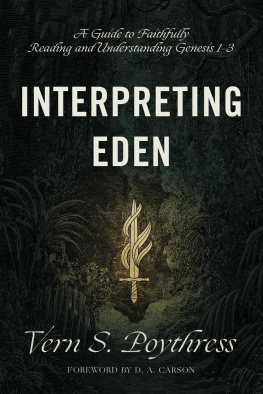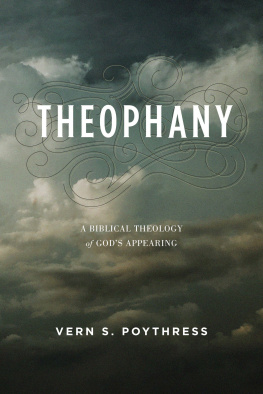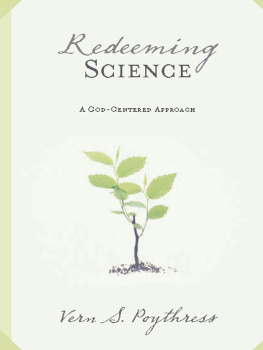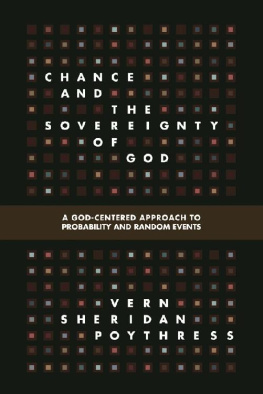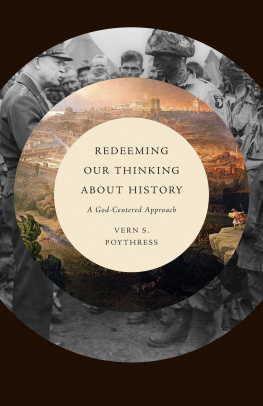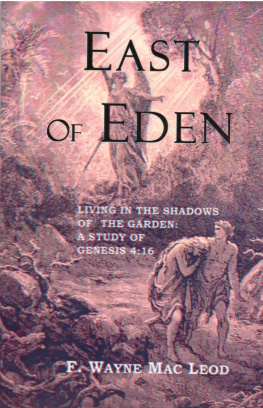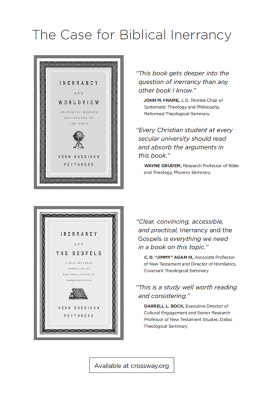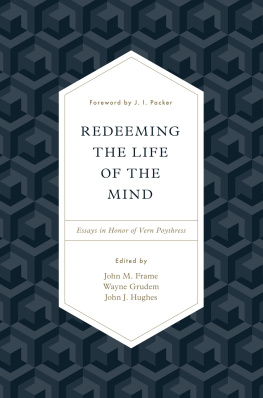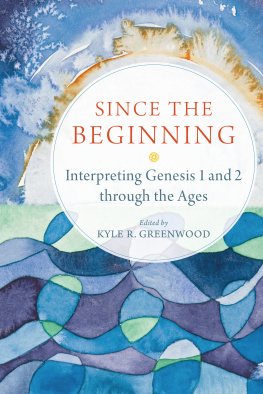Vern S. Poythress - Interpreting Eden: A Guide to Faithfully Reading and Understanding Genesis 1-3
Here you can read online Vern S. Poythress - Interpreting Eden: A Guide to Faithfully Reading and Understanding Genesis 1-3 full text of the book (entire story) in english for free. Download pdf and epub, get meaning, cover and reviews about this ebook. year: 2019, publisher: Crossway, genre: Religion. Description of the work, (preface) as well as reviews are available. Best literature library LitArk.com created for fans of good reading and offers a wide selection of genres:
Romance novel
Science fiction
Adventure
Detective
Science
History
Home and family
Prose
Art
Politics
Computer
Non-fiction
Religion
Business
Children
Humor
Choose a favorite category and find really read worthwhile books. Enjoy immersion in the world of imagination, feel the emotions of the characters or learn something new for yourself, make an fascinating discovery.
- Book:Interpreting Eden: A Guide to Faithfully Reading and Understanding Genesis 1-3
- Author:
- Publisher:Crossway
- Genre:
- Year:2019
- Rating:4 / 5
- Favourites:Add to favourites
- Your mark:
- 80
- 1
- 2
- 3
- 4
- 5
Interpreting Eden: A Guide to Faithfully Reading and Understanding Genesis 1-3: summary, description and annotation
We offer to read an annotation, description, summary or preface (depends on what the author of the book "Interpreting Eden: A Guide to Faithfully Reading and Understanding Genesis 1-3" wrote himself). If you haven't found the necessary information about the book — write in the comments, we will try to find it.
Interpreting Eden: A Guide to Faithfully Reading and Understanding Genesis 1-3 — read online for free the complete book (whole text) full work
Below is the text of the book, divided by pages. System saving the place of the last page read, allows you to conveniently read the book "Interpreting Eden: A Guide to Faithfully Reading and Understanding Genesis 1-3" online for free, without having to search again every time where you left off. Put a bookmark, and you can go to the page where you finished reading at any time.
Font size:
Interval:
Bookmark:
The God of the Bible is the only true God. If we decide to serve him, we must serve him alone. And the implications of the truth about God are extraordinarily wide -r anging . In this chapter, I sketch out preliminary implications for how we interpret the relation of the Bible to the ancient Near East, to language, and to modern science.
Gods Involvement
Let us consider how God is involved in this world. In his providential rule, God is intimately involved in everything, from the biggest wars to the movement of every ant in an anthill. He is involved in all human affairs, including all the affairs of the mindall academic subjects. As C. S. Lewis found out by experience, God makes a radical difference:
In one night the Landlordcall him by what name you wouldhad come back to the world, and filled the world, quite full without a cranny. His eyes stared and His hand pointed and His voice commanded in everything that could be heard or seen, even from this place where John sat, to the end of the world: and if you passed the end of the world He would be there too.... All things said one word: CAUGHTCaught into slavery again, to walk warily and on sufferance all his days, never to be alone; never the master of his own soul, to have no privacy, no corner whereof you could say to the whole universe: This is my own, here I can do as I please. Under that universal and inspecting gaze, John cowered like some small animal caught up in a giants hands and held beneath a magnifying -g lass .
Lewiss description sounds grim, as indeed it might seem to a person who wakes up and finds that God is bigger and more terrifying than what he expected. But Lewis goes on to tell about the grace and mercy of God found in Christ. In the end, it is not at all grimit is glorious.
How We Understand the Ancient Near East
If the truth about God has implications for every cranny of the world, it has implications for interpretationmany implications. We may begin with the last point from the previous chapter. God is a jealous God (Ex. 20:5). True service offered to the true God matters. God is distinct from all the false gods: For all the gods of the peoples are worthless idols (Ps. 96:5). If that is so, we can no longer read the information about the ancient Near East as it tends to be read in circles of modern critical scholarship.
The scholar wants to use the tools of modern scholarship, and these include tools of modern sociology, religious studies, and historiography. Many insights result by virtue of common grace. But we must also reckon with the possibility of distortion arising through the use of modern tools. The atmosphere of these tools is one in which religions are treated as human products created to respond, in some vague way, to the realm of the transcendent. All religions are fundamentally on a level. But are they? Or is there one God who denounces all false worship, even among his chosen people, Israel? Is Israel really distinct from every other people on the face of the earth by the very fact that God chose her to be his own? (See Fig. 2.1.)
Fig. 2.1: Analyzing Religions of the World
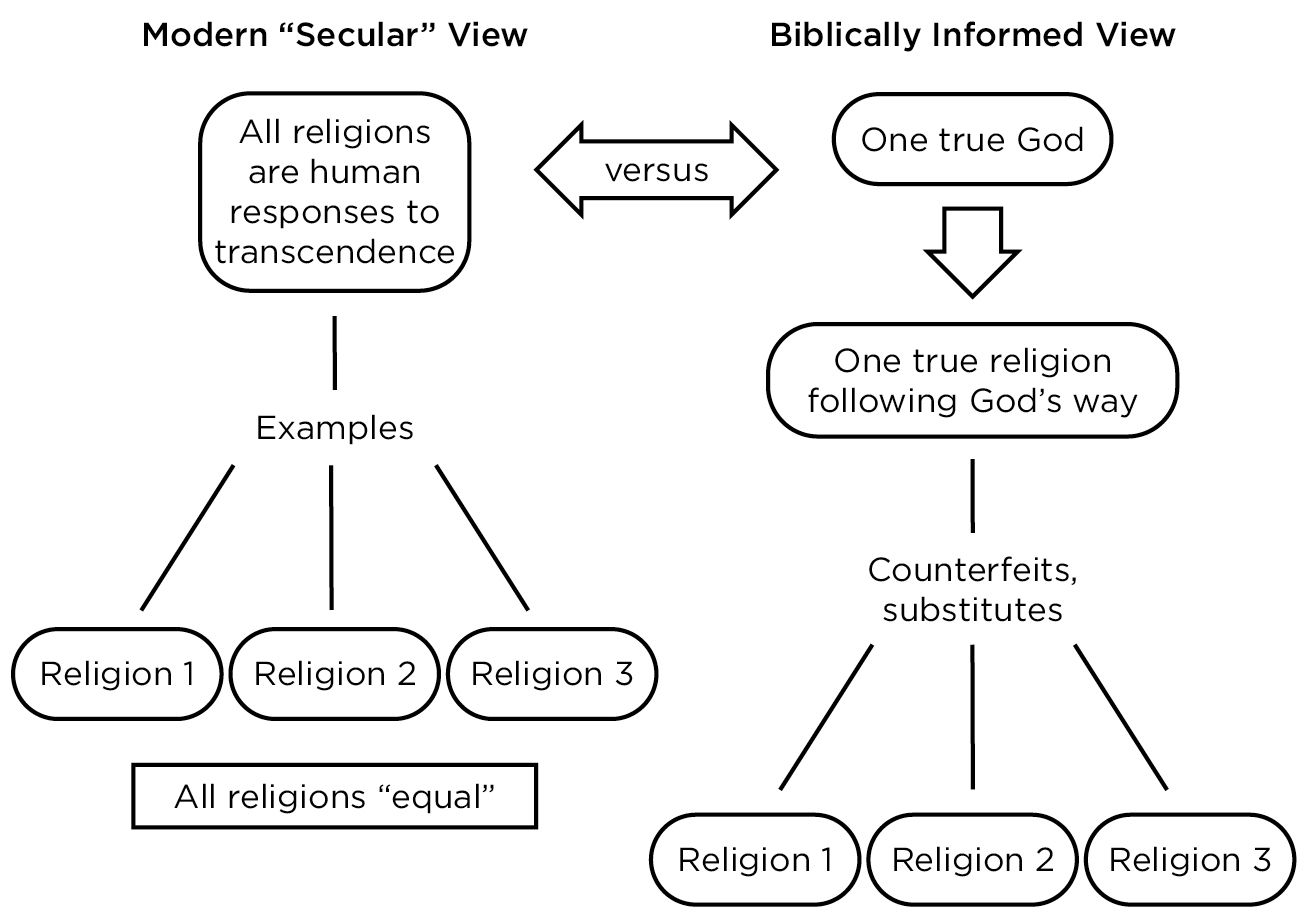
The truth about God has implications about how we interpret Genesis 13 within the larger environment of the ancient Near East. Is Genesis 13 merely one document among many ancient Near Eastern poems, myths, and traditions about the remote past? Is it one imaginary story among many about how the world gradually came to its present shape and humanity came to its present state of affairs? If God does not exist, or if he is not uniquely involved with Israel, it might seem reasonable to treat Genesis 13 as just one more document. (See Fig. 2.2)
But what if God does exist? What if God caused Genesis 13 to be written as his own communication to Israel? Can we conclude that he merely fell in with existing ways of thinking? Some people who claim to believe in the God of the Bible seem to think so. They affirm, of course, that Genesis 13 is monotheistic. It talks about only one great God, who made everything. It is different theologically from the polytheism in the ancient Near East. But does this one difference propagate into everything and make everything different in the end? By telling us later in the Bible about his jealousy, God indicates that he is contrasting himself with all traditions everywhere that involve false gods. How do we deal with this key principle? Do we say that the key for interpreting Genesis 13 is to set it in its own ancient context? Well, yes, God crafted it first of all for that ancient context. But he could say something different from and contrasting with that context. And according to his purpose, he also crafted his words so that they would continue to speak relevantly to all future generations of his people and to us (Deut. 31:913, 2429; Rom. 15:4).
Fig. 2.2: Genesis as Fitting in or Distinct
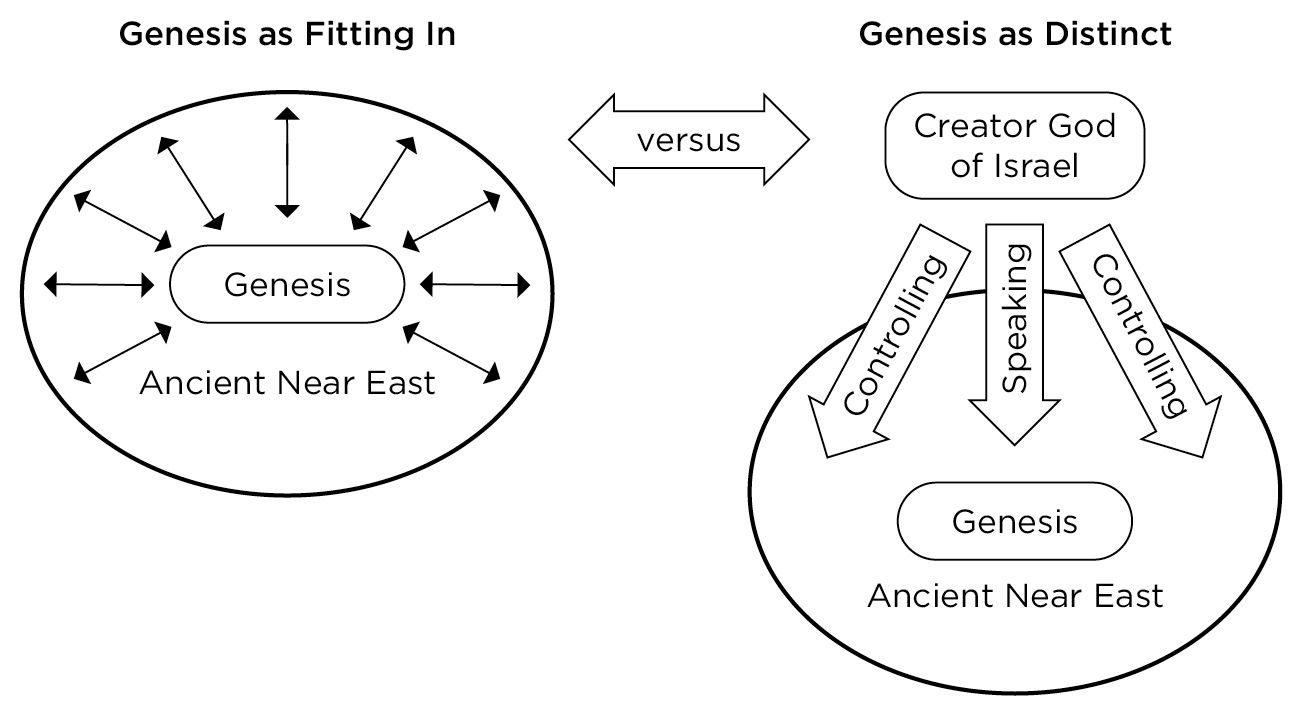
We must also reckon with how the presence of God affects our interpretation of religions in the ancient Near East. Religions are not all equal. Neither are they all innocent. Either people serve the true God or they have counterfeits. The counterfeits have fragments of the truth, but they substitute for the real thing (Rom. 1:23). They are idols. The process of counterfeiting can operate in cultural ideas about creation. The ancient Near East had counterfeit gods in counterfeit creation stories. Of course, there were similarities with the real thing, the creation story in Genesis 12. The counterfeit had to be near to the truth to be effective in holding peoples allegiance. This idea of counterfeiting, when applied to the ancient Near East, differs from a sociology -o f -r eligion approach that tries to be neutral in its analysis of all religions.
In sum, we have to rethink our principles for sociological analysis, for history, and for analyzing every single document from the past as well as the present. Putting God into the picture is radically disruptive, like putting Mount Everest in the middle of a flood plain. At the same time, we can affirm and appreciate that many piecemeal insights can arise in modern analyses by virtue of common grace. We have to be discerning.
How We Understand Language
Genesis is written in Hebrew, and Hebrew is a language. What is human language? Is it merely human? If so, is a book written in Hebrew never able to rise above the limitations of the merely human? Or is Genesis divine speech?
Here also God makes a difference. Did God really speak and say, Let there be light, before any human being existed (Gen. 13 as a wholewhether we treat it as the word of God or merely human words somehow reaching out toward a divine unknown. (See Fig. 2.3.)
Fig. 2.3: Two Views of Communication about God
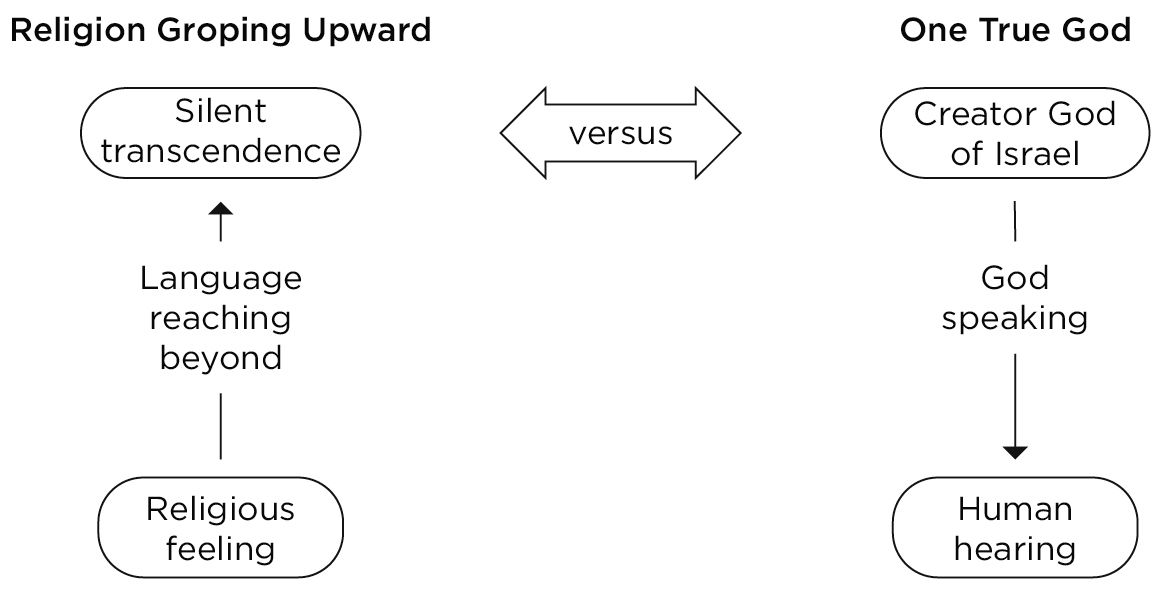
How We Understand Genesis 1
Believing in the God of the Bible also radically affects our understanding of Genesis 1. This God of the Bible can do as he pleases (Ps. 115:3). It really is the case that, if he says Let there be light, there is light (Gen. 1:3). Events can take place that are radically different from what we experience today if God is pleased to cause them.
The modern West tends to take the existing order of things as a fixed point. It approaches Genesis 1 within that kind of framework. And so, the thinking goes, Genesis 1, if it is to be more than fanciful fiction, must be primarily about this existing order. Therefore, it is some kind of vaguely poetic account concerning Gods relation to that order. It is only a short step to conclude that Genesis 1 is theological in contrast to being about space -t ime events that happened once in a particular temporal order in the distant past. But if God is God, we cannot make assumptions merely on the basis of the present order of things, as if that were eternal. (To make the present order eternal is actually to begin to produce a substitute god in the form of a second eternity, the eternity of the present order.)
Font size:
Interval:
Bookmark:
Similar books «Interpreting Eden: A Guide to Faithfully Reading and Understanding Genesis 1-3»
Look at similar books to Interpreting Eden: A Guide to Faithfully Reading and Understanding Genesis 1-3. We have selected literature similar in name and meaning in the hope of providing readers with more options to find new, interesting, not yet read works.
Discussion, reviews of the book Interpreting Eden: A Guide to Faithfully Reading and Understanding Genesis 1-3 and just readers' own opinions. Leave your comments, write what you think about the work, its meaning or the main characters. Specify what exactly you liked and what you didn't like, and why you think so.

